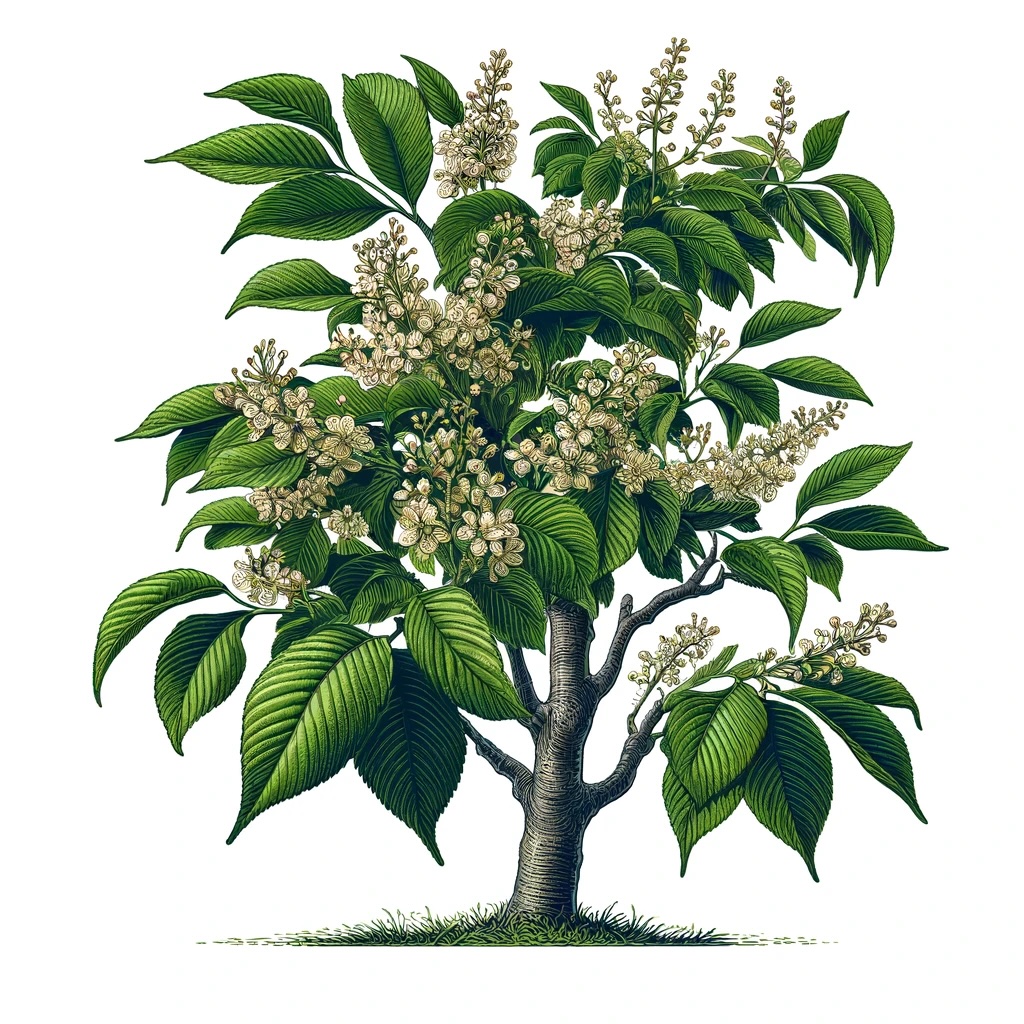This website contains affiliate links for products I use and love. If you take action (i.e. subscribe, make a purchase) after clicking a link, I may earn some tea money, which I promise to drink while creating more helpful content like this.
Create Your Own Herbal Remedies for Respiratory Wellness
Your first block of text...Breathing isn't just a necessity; it's the essence of vitality and health. At Herbal Ella, we cherish the power of nature to heal and sustain our bodies. This guide is designed to help you harness the therapeutic benefits of herbs for respiratory health. Whether you're looking to soothe a cough, clear congestion, or enhance lung capacity, our DIY herbal remedies provide you with natural, effective solutions right from your kitchen.
Overview of Herbal Benefits for the Respiratory System
Herbs have been a cornerstone of natural medicine for centuries, offering a wealth of benefits to support respiratory health. Many herbs possess properties that are particularly effective in treating respiratory conditions by soothing irritated tissues, reducing inflammation, and facilitating the clearance of mucus from the lungs and airways. Here, we explore how these natural remedies can enhance lung health and provide relief from respiratory ailments.
Anti-inflammatory Properties: Inflammation is a common response of the body to infection or irritation, but when chronic, it can lead to severe respiratory conditions such as bronchitis and asthma. Herbs like turmeric and ginger are renowned for their anti-inflammatory effects. They work by reducing inflammation in the airways, easing breathing, and helping to manage symptoms associated with chronic respiratory conditions.
Expectorant Properties: Expectorant herbs play a critical role in respiratory care by aiding the expulsion of mucus from the lungs and air passages. This action is crucial for clearing the respiratory tract, which helps to prevent infections and improves breathing. Herbs such as licorice root and elecampane are highly valued for their expectorant capabilities, making them excellent choices for treating colds, coughs, and bronchitis.
Antitussive Properties: Coughing is a natural reflex to clear the breathing passages; however, excessive coughing can be debilitating and painful. Antitussive herbs help suppress the cough reflex and reduce the frequency and intensity of coughs. Marshmallow root and wild cherry bark are particularly effective in calming the cough reflex and soothing the throat, providing much-needed relief during respiratory flare-ups.
These herbal remedies offer a gentler alternative to pharmaceuticals with the added benefits of fewer side effects and holistic healing properties. By integrating these herbs into your healthcare routine, you can support and enhance your respiratory system naturally and effectively.
Herbal Recipes for Respiratory Health
Herbal teas and infusions are a gentle and effective way to deliver the healing properties of herbs directly to the respiratory system. These soothing beverages can help alleviate irritation, support immune function, and promote overall lung health. Here are a couple of herbal tea recipes that are particularly beneficial for respiratory health.
Herbal Teas and Infusions
Mullein Leaf Tea
Ingredients:
- 1 to 2 teaspoons of dried mullein leaves
- 1 cup of boiling water
- Honey or lemon (optional, for taste)
Instructions:
- Place the dried mullein leaves in a tea infuser or directly into a cup.
- Pour boiling water over the leaves and allow them to steep for 10 to 15 minutes. This long infusion time allows the water to extract the soothing mucilage and other beneficial compounds from the leaves.
- Strain the tea to remove the leaves. Add honey or lemon to taste if desired.
- Drink the tea hot to help soothe the throat, clear congestion, and reduce inflammation in the respiratory tract.
Benefits: Mullein tea is renowned for its ability to clear the lungs, reduce respiratory inflammation, and soothe the mucous membranes in the airways. Its mild sedative properties also help to alleviate coughing.
Licorice Root Tea
Ingredients:
- 1 teaspoon of dried licorice root
- 1 cup of boiling water
- Cinnamon or ginger (optional, for enhanced flavor and additional anti-inflammatory benefits)
Instructions:
- Add the dried licorice root to a tea infuser or teapot.
- Pour boiling water over the licorice root and let it steep for about 10 minutes. Licorice root releases its sweet, soothing properties slowly, so a longer steeping time is beneficial.
- Strain the infusion into a cup. You can add a pinch of cinnamon or ginger for extra flavor and additional respiratory benefits.
- Enjoy this tea warm to maximize its soothing effects on the throat and its expectorant capabilities.
Benefits: Licorice root tea is beneficial for treating sore throat, dry cough, and other respiratory ailments. It acts as an expectorant, helping to loosen and expel mucus from the respiratory tract, while its anti-inflammatory properties help to soothe irritation.
These herbal teas are simple to prepare and offer a natural, comforting way to enhance respiratory health. Regular consumption can help manage symptoms associated with common respiratory conditions, providing relief and supporting the body’s natural healing processes.
Herbal Tinctures and Syrups
For those seeking stronger, more concentrated herbal remedies, tinctures and syrups offer potent alternatives to teas and infusions. These forms of herbal preparations deliver a more robust dosage of the plant’s active ingredients and are particularly useful during acute respiratory distress or when longer-term storage is needed. Below are recipes for creating an Elecampane root tincture and a Wild Cherry bark syrup, both renowned for their respiratory benefits.
Elecampane Root Tincture
Ingredients:
- 1 part dried Elecampane root
- 5 parts high-proof alcohol (such as vodka or brandy)
Instructions:
- Chop or grind the dried Elecampane root to increase the surface area for extraction.
- Place the prepared root in a clean glass jar.
- Pour the high-proof alcohol over the roots until they are completely submerged. The ratio should be around one part herb to five parts alcohol.
- Seal the jar tightly and label it with the date and contents.
- Store the jar in a cool, dark place for 4 to 6 weeks, shaking it daily to mix the contents.
- After the maceration period, strain the tincture through a fine mesh sieve or cheesecloth into another clean jar or bottle. Squeeze or press the marc (the solid plant material) to extract as much liquid as possible.
- Store the strained tincture in a dark glass bottle, ideally with a dropper for easy use.
Benefits: Elecampane root tincture is particularly effective for chronic bronchitis and other respiratory conditions where phlegm congestion is a problem. It acts as an expectorant to help clear excess mucus from the lungs, and its antimicrobial properties may help reduce infections.
Wild Cherry Bark Syrup
Ingredients:
- 1 part dried Wild Cherry bark
- 4 parts water
- Honey (or another natural sweetener, to taste)
Instructions:
- Place the dried Wild Cherry bark in a saucepan with water.
- Bring the mixture to a boil, then reduce heat and simmer gently until the liquid is reduced by about half.
- Strain the liquid through a fine mesh sieve or cheesecloth, pressing the bark to extract as much liquid as possible.
- While the liquid is still warm, add honey to taste. Stir until the honey is fully dissolved.
- Allow the syrup to cool, then pour it into a clean glass bottle for storage.
- Label the bottle with the date and contents. Store the syrup in the refrigerator, where it will keep for several months.
Benefits: Wild Cherry bark syrup is an excellent remedy for calming irritating coughs, especially those dry, hacking types that interfere with sleep. It contains natural compounds that help soothe the respiratory tract and reduce inflammation, making it easier to breathe.
These herbal tinctures and syrups are invaluable tools for managing respiratory health, offering strong, direct support where it’s needed most. They can be used on their own or as part of a broader, holistic approach to respiratory wellness.
Steam Inhalations and Essential Oil Blends
Steam inhalations and essential oil blends are effective methods for delivering therapeutic herbal benefits directly to the respiratory system. These techniques are particularly useful for alleviating congestion, sinus pressure, and respiratory discomfort. Below are detailed instructions for using eucalyptus and peppermint essential oils, both known for their powerful decongestant properties.
Eucalyptus Steam Inhalation
Ingredients:
- 3 to 5 drops of eucalyptus essential oil
- A bowl of boiling water
Instructions:
- Pour boiling water into a large, heat-proof bowl.
- Add 3 to 5 drops of eucalyptus essential oil to the water. Eucalyptus oil is celebrated for its ability to clear nasal passages and reduce sinus pressure thanks to its potent anti-inflammatory and decongestant properties.
- Lean over the bowl, and cover your head and the bowl with a towel to trap the steam.
- Breathe in deeply and slowly through your nose for 5 to 10 minutes. Try to inhale the steam as directly as possible; however, be careful to avoid burning your face with the steam or hot water.
- Repeat the inhalation 2 to 3 times a day as needed to relieve congestion.
Peppermint Essential Oil Blend for Diffusion
Ingredients:
- 4 drops of peppermint essential oil
- 2 drops of eucalyptus essential oil
- An essential oil diffuser
Instructions:
- Fill your diffuser with water up to the recommended level.
- Add 4 drops of peppermint essential oil and 2 drops of eucalyptus essential oil to the water. Peppermint oil provides a cooling sensation that can help soothe irritated nasal passages and airways, while eucalyptus oil helps to reduce inflammation and congestion.
- Turn on the diffuser and allow the oils to permeate the room. Breathe normally and let the medicinal properties of the oils work their way through your respiratory system.
- Use the diffuser in your living space or bedroom for up to 30 minutes. This can be particularly soothing before bedtime, especially if sinus pressure or respiratory congestion is interfering with sleep.
Benefits: Both eucalyptus and peppermint are excellent for respiratory health. Eucalyptus oil helps to open up the airways, clear mucus, and reduce congestion, while peppermint oil can relieve headaches and muscular tension often associated with sinus pressure.
These methods of using steam inhalations and essential oil blends are not only effective but also provide a soothing, therapeutic experience that can be easily incorporated into daily routines to help manage and alleviate respiratory symptoms.
Tips for Safe and Effective Herbal Remedy Use
While herbal remedies offer a natural and often gentle alternative to conventional medicine, it's crucial to use them wisely to ensure they are both safe and effective. Here are some important guidelines on dosage, awareness of potential side effects, and knowing when to consult with a healthcare provider.
Understanding Dosage
The effectiveness of herbal remedies largely depends on the correct dosage. Too little may be ineffective, while too much could cause adverse effects. It's important to:
- Follow Guidelines: Start with the lowest recommended dose and observe your body’s response. Dosage recommendations on product labels or from reputable sources should always be followed unless advised otherwise by a healthcare professional.
- Adjust as Needed: Depending on your response, the dosage may need to be adjusted. However, increases should be made cautiously and ideally under the guidance of a healthcare provider who understands herbal medicine.
Recognizing Potential Side Effects
Like all forms of treatment, herbal remedies can cause side effects, especially if not used correctly. Be aware of:
- Common Side Effects: These might include gastrointestinal upset, allergic reactions, or headaches. Familiarize yourself with the known side effects of any herb you plan to use.
- Interactions: Herbs can interact with prescription medications, over-the-counter drugs, and other herbs. For example, St. John’s Wort can interfere with the effectiveness of birth control pills and certain antidepressants.
- Allergic Reactions: Even natural products can trigger allergies. If you experience symptoms such as rash, itching, or difficulty breathing, discontinue use and consult a healthcare provider immediately.
When to Consult a Healthcare Provider
It’s crucial to consult with a healthcare provider in certain situations:
- Chronic or Severe Conditions: If you have a chronic respiratory condition or your symptoms are severe, it’s important to seek professional medical advice before starting any new herbal treatment.
- Pregnancy and Breastfeeding: Women who are pregnant or breastfeeding should consult a healthcare provider before using any herbal remedies as some ingredients can be harmful to the baby.
- Existing Medications: If you are taking other medications, it’s important to discuss potential interactions with your doctor or a pharmacist.
- Lack of Improvement or Worsening Symptoms: If symptoms do not improve or worsen after using an herbal remedy, professional medical advice should be sought.
Benefits of Professional Guidance: Consulting with professionals can provide you with safety, maximize the efficacy of your treatment, and integrate herbal remedies into your health routine responsibly.
By adhering to these guidelines, you can use herbal remedies to their fullest potential while ensuring your safety and well-being. Remember, the goal of using herbal treatments is to support and enhance your health without causing additional concerns.
Embrace Your Journey to Respiratory Health with Nature's Bounty
Thank you for exploring the nurturing world of herbal remedies for respiratory health with us. At Herbal Ella, we believe that nature offers a profound wisdom that can help us breathe easier and live more vibrantly. Each herb in our collection has a story, a legacy of healing that spans centuries and cultures, ready to be part of your wellness journey.
As you incorporate these herbal practices into your daily routine, remember that each small step is a leap towards better health. Whether it’s sipping a soothing cup of mullein leaf tea, crafting a potent elecampane root tincture, or relaxing with a eucalyptus steam inhalation, you’re taking powerful action to enhance your respiratory wellness.
We invite you to dive deeper into the fascinating world of each herb mentioned here. Visit our Herb Index to explore detailed monographs that provide insights into the history, uses, and science behind these natural healers. Discover more about their benefits, learn how to harness their properties safely, and understand why these herbs have been cherished through the ages.
Thank you for trusting Herbal Ella to guide you on this green path. Remember, every breath is a gift—nurture it with the care of the natural world, and let’s breathe better together.
The information provided on this website is for educational purposes only, and is not FDA approved. It is not to be considered health advice. Always do your own research and seek the guidance of a qualified healthcare practitioner before working with any herb. Herbal Ella is not liable for any action or inaction you take with the materials and information provided. Read here for more information.
Recent Articles
-
Wild Cherry Monograph: Wild Cherry: Nature's Respiratory Ally
May 02, 24 04:52 PM
Discover the healing potential of Wild Cherry with our comprehensive monograph. Explore its benefits and uses for respiratory health. -
DIY Herbal Remedies for Respiratory Health
May 02, 24 03:46 PM
Explore easy DIY herbal remedies for respiratory health with Herbal Ella. Learn to make teas, tinctures, and more to breathe better naturally -
Understanding the Respiratory System - Anatomy and Functions
May 02, 24 03:23 PM
Discover the respiratory system's anatomy and functions with clear visuals and simple explanations to keep you breathing healthily
* Privacy Policy * Disclaimer *










